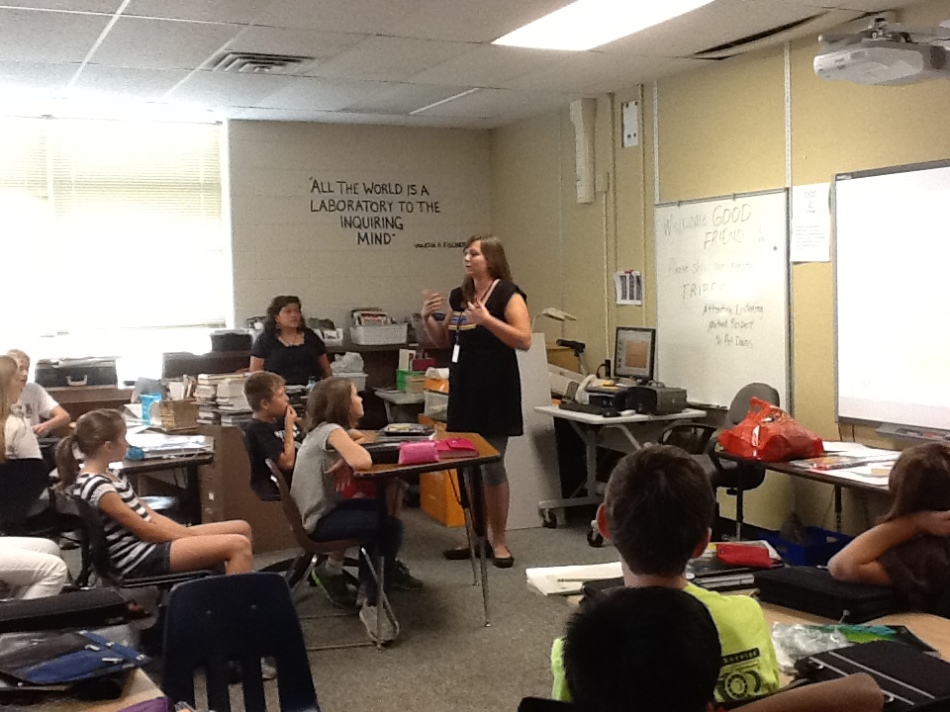While home in Wisconsin I had the opportunity to visit Waukesha STEM and speak in 5 of the middle school classes there. It was great to be there for lots of reasons– my older sister is an Instructional Resource Teacher there, STEM is doing great things and it’s the school I worked at for half a year before I left for Peace Corps, and Mrs.Lambert graciously opened her classrooms (primarily Spanish classes) to me!
I talked to the students a bit about my work, showed them photos and a video of Paraguay and tried to leave time for questions. The STEM students had also worked on coloring Beginning Reader books in Spanish that I laminated and brought back to Paraguay with me. A raffle that my youth group in Paraguay did raised the money to cover the printing and lamination costs– so it truly was an international collaboration! We just donated the books to a low-income daycare center in Paraguari last week.
Mrs. Lambert and I have now formally matched through Peace Corps’ World Wise Schools Program and hope to continue the exchange we began. Students in my English for Tourism class are currently working to prepare short videos on Paraguayan culture in English and her students plan to include Paraguay in their market research in their toy development project!

As is to be expected to be found in every middle school there were kids who had “too cool for school” attitudes. Upon hearing that Paraguayans only go to school for 4 hours a day or that they cancel school every time it rains or that there are rarely textbooks/books available to check out at a school, etc. some kids responded with, “Cool! I want to go to school in Paraguay.”
At the time I couldn’t come up with a much better response than, “No, really you don’t.” But I was left thinking a lot about all of the different ways I could have answered. For some peace of mind I decided to open the question up to a group of my Paraguayan students– “Why are they lucky to go to school in the United States?”
My students had a lot to say:
- Think farther ahead than the moment you are currently in, you all have access to more opportunities than we ever will– take advantage of them!
- Your schools have all sorts of resources in one place: books, classes, computers, a lunch room, after school activities and clubs, and you can see your friends
- Enjoy that your teachers force you to read, it will make for a brighter future
- Take advantage of a full school day. We only have 4 hours of school but they try and cram in a subject range meant for a whole school day, which means that most subjects are under-taught if not just randomly cut all together (since the nation wide required curriculum is determined by the country’s government)
- Compare the country situations where we live– Paraguay to the U.S. (This document is helpful: http://www3.weforum.org/docs/GCR2011-12/CountryProfiles/Paraguay.pdf Quality of primary education is ranked 137 out of 142 countries worldwide)
- We think that someone who’s a “nerd” in Paraguay would be considered almost normal in the U.S. It’s hard to be a nerd (interested in academic things) in Paraguay
- No one finishes high school prepared to go to college. Entrance to college is contingent upon passing the University’s “Cursillo,” an intensive remedial course.
- Teachers have lost their power to parents and principals so they have to generally just pass students and not require high standards of classroom conduct and work in order to keep their jobs.
- Private elementary and high schools are usually much better than public, but cost a lot of money each year. Going to public school usually means Mission: Impossible to get into a good university in Paraguay.
- And finally, “Just tell them, don’t be a bobo.” (stupid head)
This was an awesome conversation to have with my students and they really got into it. It definitely speaks to the challenges of development and education– as knowing something with your brain does not mean that you will actually incorporate that thing into your life. Even this group of hardworking Paraguayan students who have chosen to keep showing up and studying with me outside of their normal school day, and who have lots of advice for others about taking advantage of all opportunities provided by the great US of A, don’t necessarily take advantage of all of the opportunities offered to them here or behave like little angels in all of my classes.
So, how do we bridge the gap between what we know we should do and what we actually do?
And how do we teach things to be adopted into one’s lifestyle and not only absorbed into their brain?
Tags: paraguay, peace corps, STEM, Waukesha, worldwise schools


